How Therapy Helps With Time Management and Focus
May 14, 2025
Unlocking Your Potential: The Power of Therapy in Enhancing Focus and Time Management

Understanding the Link Between Mental Well-being and Effective Time Use
Effective time management and sustained focus are essential for personal and professional success. However, psychological barriers such as anxiety, perfectionism, and attention difficulties can hinder an individual’s ability to organize, prioritize, and complete tasks efficiently. Therapy emerges as a powerful tool not only for addressing mental health challenges but also for fostering skills and strategies that improve focus and time management. This article explores how therapy contributes to enhancing productivity and emotional health, offering insights into various therapeutic approaches, practical tools, and the psychological factors that influence our ability to manage time.
The Psychological Foundations of Time Management and Focus
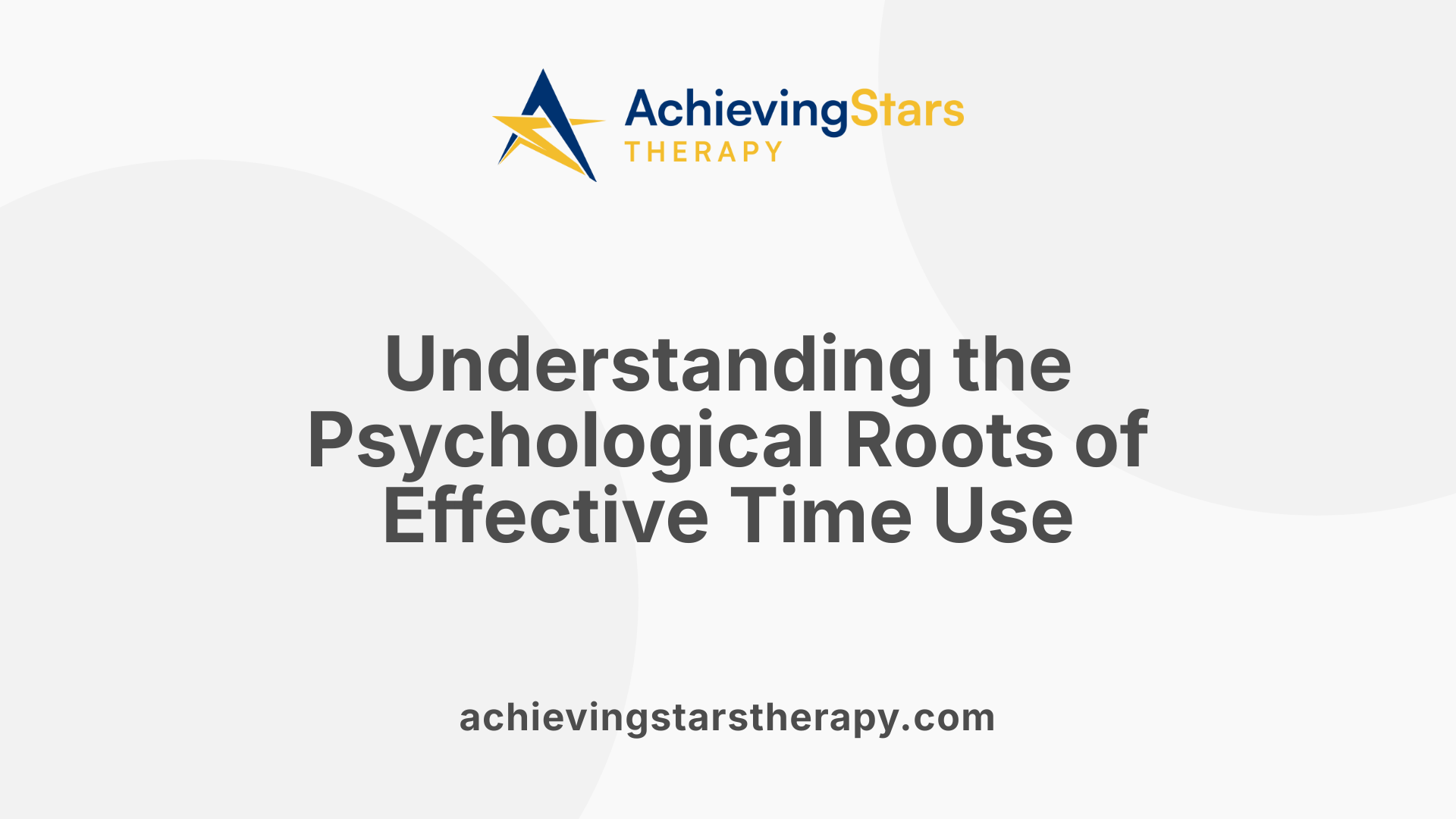
How do psychological factors impact time management and focus, and how does therapy address these issues?
Mental health plays a crucial role in how effectively individuals manage their time and sustain focus. Psychological barriers such as procrastination, perfectionism, and cognitive biases like the planning fallacy can significantly impair productivity.
Procrastination often leads to last-minute rushes, increased stress, and decreased quality of work. It stems from fears of failure, feelings of overwhelm, or avoidance of uncomfortable tasks. Similarly, perfectionism causes individuals to spend excessive time refining details, which hampers progress and fosters frustration.
Cognitive biases like the planning fallacy cause people to underestimate how long tasks will take, leading to poor scheduling and missed deadlines. These patterns diminish deep engagement with tasks and increase emotional strain.
Therapy offers effective solutions to these challenges. Approaches such as Cognitive Behavioral Therapy (CBT) help clients identify and challenge negative thought patterns that foster avoidance or perfectionism. For instance, CBT techniques can reframe beliefs about failure and perfection, promoting more forgiving attitudes.
Acceptance and Commitment Therapy (ACT) enhances emotional regulation through mindfulness, enabling individuals to accept their feelings without judgment and commit to valued actions. This helps reduce avoidance behaviors and increases resilience against distractions.
Therapeutic interventions also focus on goal setting, breaking tasks into manageable steps, and fostering self-awareness—all strategies that directly improve focus and time management skills. Through these methods, therapy helps individuals develop healthier attitudes towards their responsibilities, thus reducing stress and enhancing overall productivity.
Addressing psychological barriers is not only about improving efficiency but also about promoting mental wellbeing. When negative thought patterns like procrastination and perfectionism are managed, individuals experience less anxiety, increased satisfaction with their accomplishments, and a greater capacity to focus, leading to a more balanced and fulfilling life.
In summary, psychological factors greatly influence time management and focus. Therapy provides essential tools to identify, understand, and overcome these mental barriers, fostering healthier habits and improving mental health.
Strategies and Techniques to Improve Time Management through Therapy
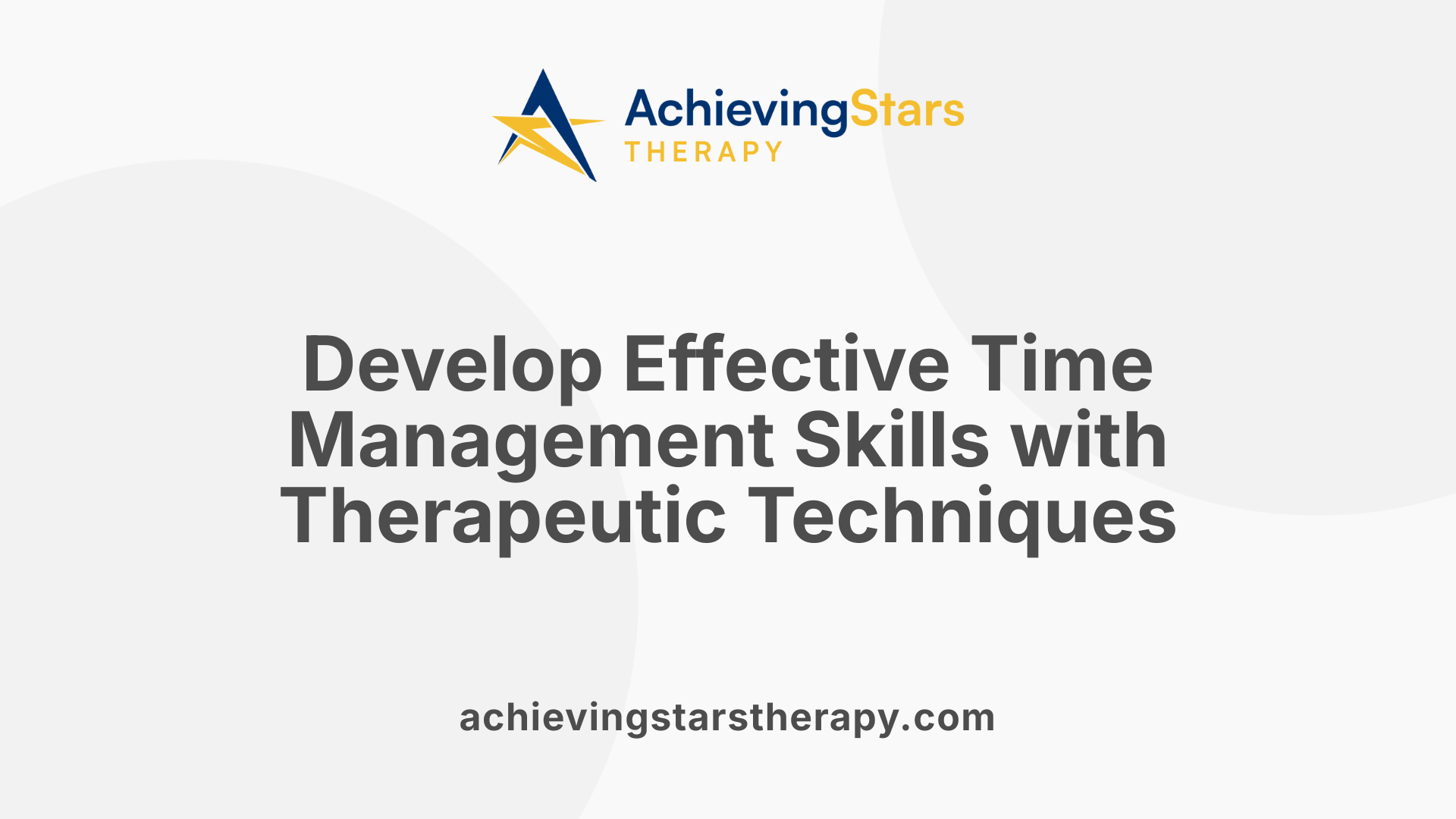
What therapeutic approaches and methods are used to develop skills in focus and effective time management?
Therapists utilize a variety of approaches to help individuals improve their focus and manage time more effectively. One prominent method is cognitive-behavioral therapy (CBT), which targets negative thought patterns like procrastination and perfectionism. Through CBT, clients learn to challenge irrational beliefs about time and develop healthier attitudes toward task completion.
Mindfulness practices also play a crucial role. Exercises such as meditation and present-moment awareness techniques help strengthen attention span and reduce mental clutter. These practices encourage individuals to stay grounded, improving their ability to concentrate on tasks without distraction.
Behavioral strategies form another foundation. Techniques like the Pomodoro Technique—working in timed intervals with short breaks—enable focused work sessions. Tools such as the Eisenhower Matrix assist in prioritizing tasks based on urgency and importance, guiding better decision-making. Time blocking involves scheduling specific periods for focused activities, which helps prevent distraction and enhances productivity.
Beyond these methods, lifestyle interventions are vital. Ensuring adequate sleep, engaging in regular exercise, and maintaining a balanced diet support cognitive function and attention. Skill-building activities, including cognitive training games and education on science-based tools, empower individuals to develop sustainable routines. These combined approaches foster better planning, reduce stress, and ultimately lead to more efficient use of time.
Addressing Underlying Issues that Affect Concentration and Organization
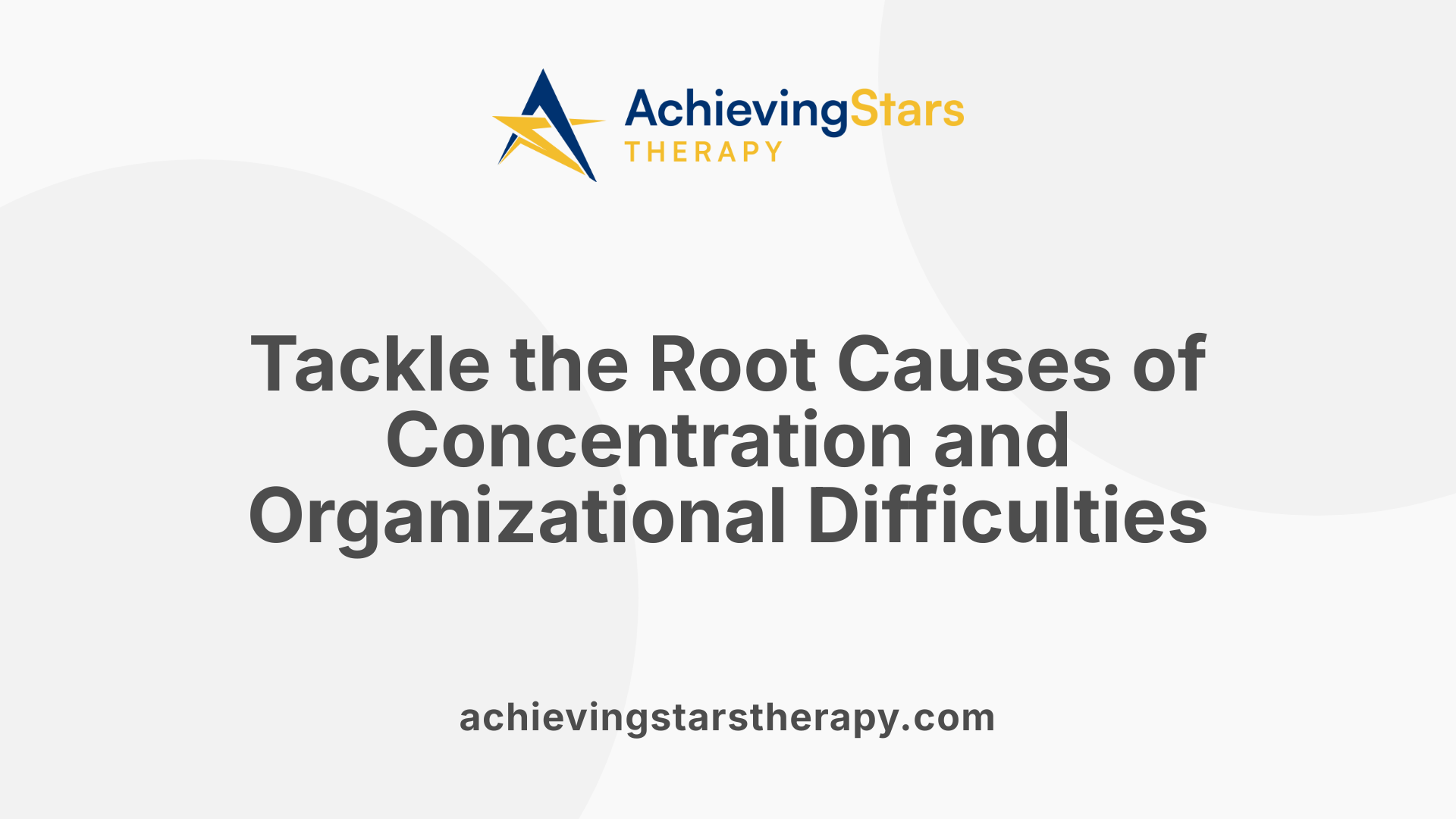
How does therapy help address underlying issues that affect concentration and organizational skills?
Therapy plays a crucial role in tackling the root causes that hinder focus and organization. Specifically, Cognitive Behavioral Therapy (CBT) is frequently used to help individuals identify and change negative thought patterns that can impair concentration. For example, beliefs like "I am always forgetful" or "I cannot stay focused" are challenged and replaced with healthier, more realistic perspectives.
During therapy sessions, clients learn to recognize distorted thinking and emotional responses that contribute to mental fatigue and distractibility. Techniques such as mindfulness, problem-solving, and stress management are employed to help manage overwhelming feelings and reduce mental clutter that hampers organizational skills.
Therapists also work with clients to develop practical coping strategies. These include creating structured routines, breaking tasks into manageable steps, and implementing time management tools. Lifestyle modifications are often integrated, such as improving sleep hygiene, practicing regular physical activity, and maintaining a balanced diet, all of which support better brain function.
In addition, therapy addresses emotional and psychological barriers like anxiety, perfectionism, or low self-esteem that can interfere with focus. By understanding and modifying these underlying issues, individuals gain greater self-awareness and confidence in managing their daily responsibilities.
Personalized plans benefit from ongoing reassessment, allowing adjustments that align with evolving needs. Overall, therapy helps individuals understand the psychological and behavioral patterns impeding their ability to concentrate and stay organized, leading to noticeable improvements in daily functioning, mental clarity, and productivity.
Therapeutic Approaches for Fostering Focus and Effective Time Use
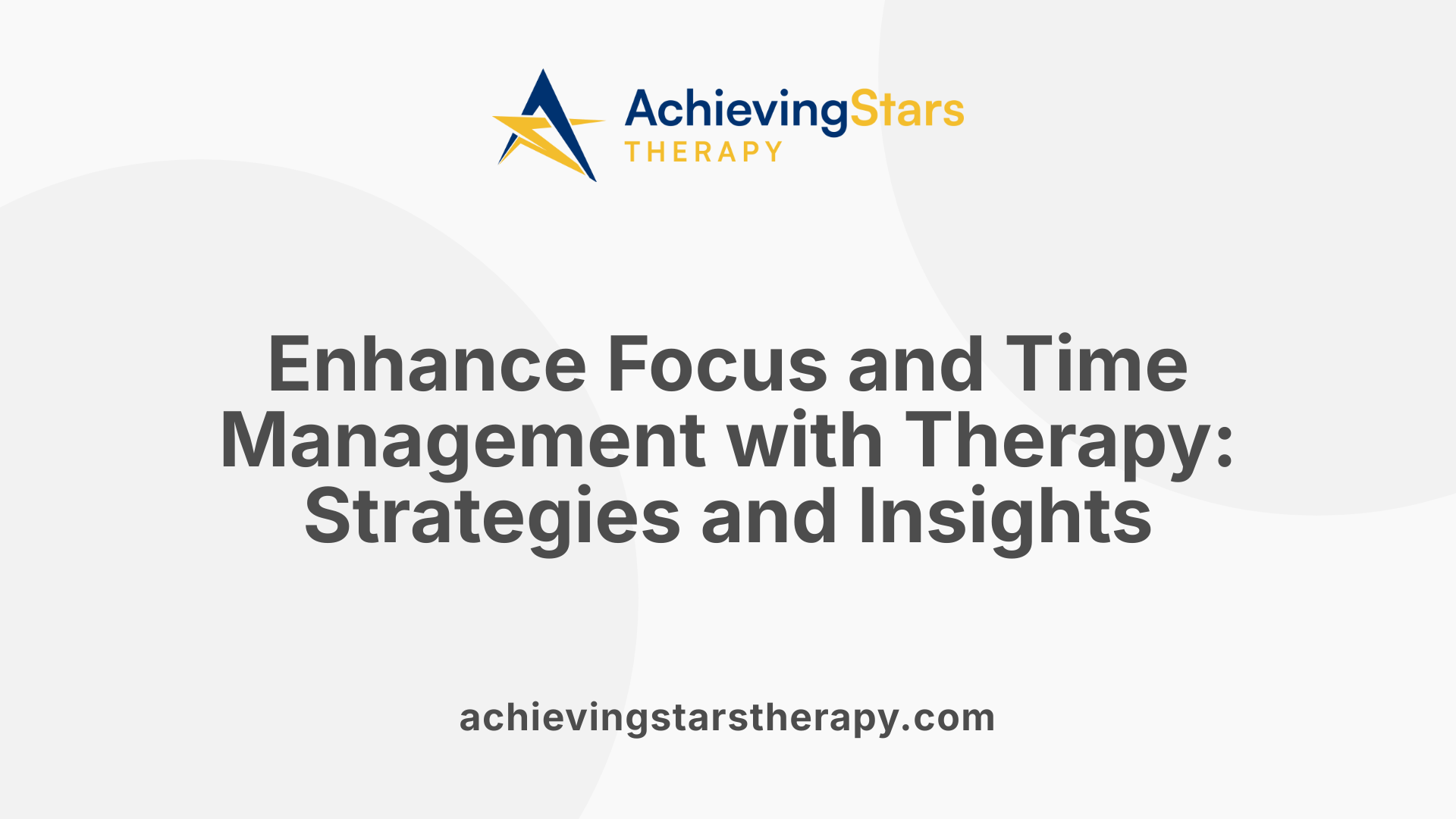
What therapeutic approaches and methods are used to develop skills in focus and effective time management?
Developing effective time management skills often involves a combination of therapeutic techniques that address both the mental and behavioral aspects of focus. One widely used approach is cognitive-behavioral therapy (CBT). CBT techniques help individuals identify and challenge negative thought patterns, such as procrastination, perfectionism, and irrational beliefs about their abilities or the time they have available. By working through these mental barriers, clients can develop better self-control, realistic planning, and prioritization skills.
Mindfulness-based interventions are also prominent in improving focus. Practices such as meditation, breathing exercises, and present-moment awareness activities help reduce mental clutter and enhance attention span. Regular mindfulness exercises cultivate awareness of one’s mental state, allowing individuals to recognize distractions early and gently redirect their focus, fostering sustained concentration.
Behavioral strategies are integral to translating therapy into real-world skills. These techniques include structured scheduling methods like time blocking, the Pomodoro Technique, and the Eisenhower Matrix. These tools facilitate task prioritization, help break large projects into manageable steps, and enable individuals to allocate their time efficiently. Establishing routines and using visual timers or alarms reinforce time awareness and discipline.
Lifestyle factors also play an essential role. Therapies often incorporate advice on maintaining healthy sleep patterns, engaging in regular physical activity, and adopting a nutritious diet. These habits support cognitive function and help sustain attention over longer periods.
Furthermore, skill development can be pursued through cognitive training exercises, which enhance mental agility, and education on science-based time management tools. Learning and practicing these strategies empower clients to develop sustainable habits that improve focus, reduce stress, and optimize productivity over time.
In summary, effective therapy combines mental, behavioral, and lifestyle interventions to cultivate focus and efficient use of time, ultimately improving both personal and professional productivity.
Supporting Individuals with ADHD and Other Attention Challenges
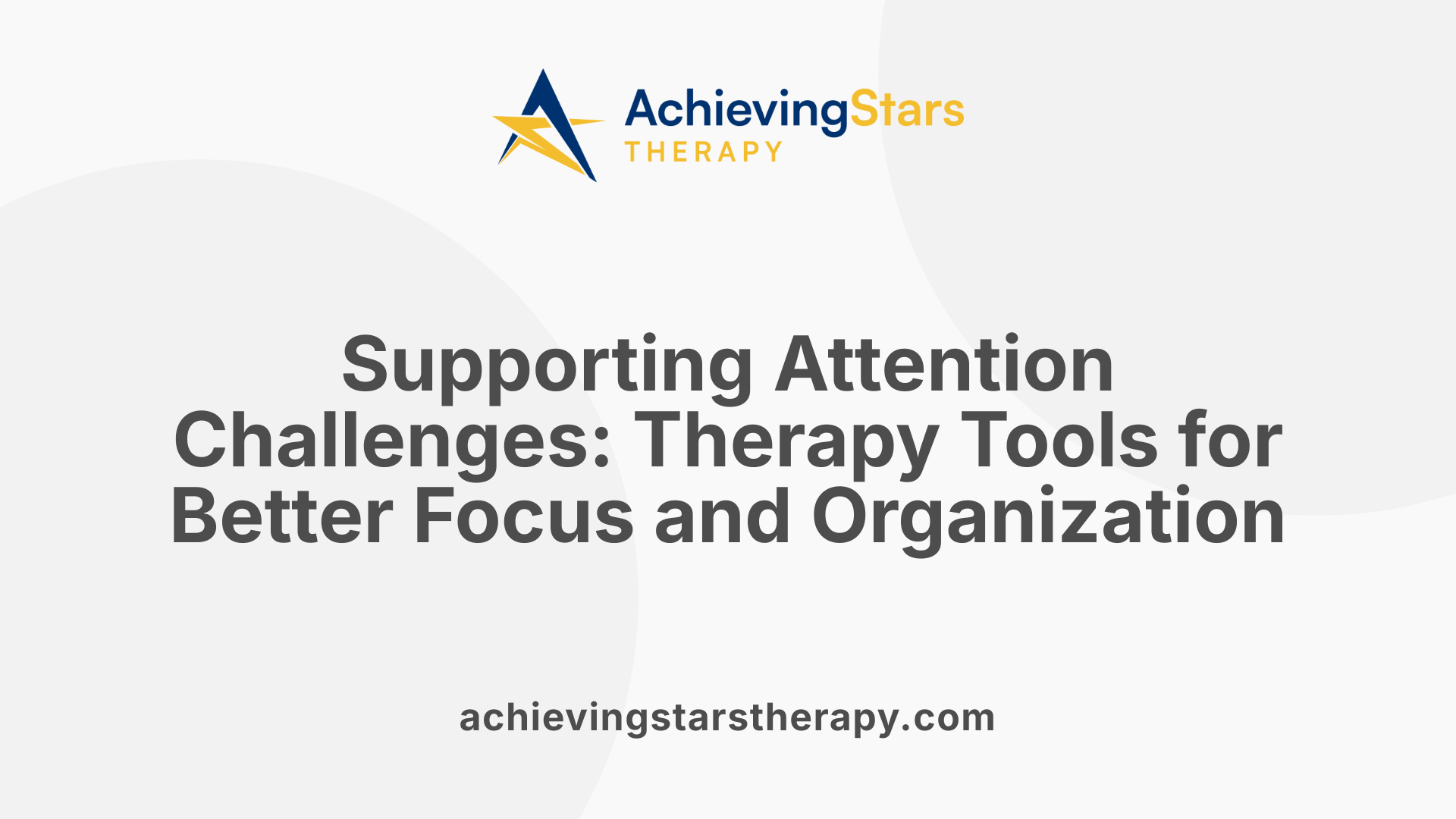
How can therapy help individuals, including those with ADHD, manage their time better and stay focused?
Therapy plays a vital role in helping individuals with ADHD improve their time management and concentration skills. It offers practical tools such as organizational strategies, planning techniques, and self-monitoring practices using approaches like Cognitive Behavioral Therapy (CBT). CBT helps clients identify and challenge negative thought patterns related to procrastination or distractibility, enabling them to develop healthier habits.
In addition to cognitive techniques, behavioral interventions are essential. These may include parent training programs and classroom strategies designed to reduce problematic behaviors and reinforce routines that promote time awareness and task completion.
Mindfulness-based therapies are also effective. Practices like mindfulness meditation and Mindfulness-Based Cognitive Therapy (MBCT) increase attention span, emotional regulation, and self-awareness. These skills help individuals recognize when their focus drifts and gently bring their attention back, fostering better concentration.
Support systems such as ADHD coaching or support groups provide personalized guidance, accountability, and emotional encouragement. Coaches help set realistic goals, create structured routines, and develop tailored strategies to overcome challenges.
When combined, these approaches—behavior therapy, mindfulness, and support—offer a comprehensive framework. They empower individuals with ADHD to manage their symptoms effectively, improve daily functioning, and sustain motivation over time. With professional assistance, many find a noticeable improvement in their ability to organize their tasks, stay focused, and reduce stress.
Dispelling Myths and Clarifying Effective Practices About Therapy and Time Management
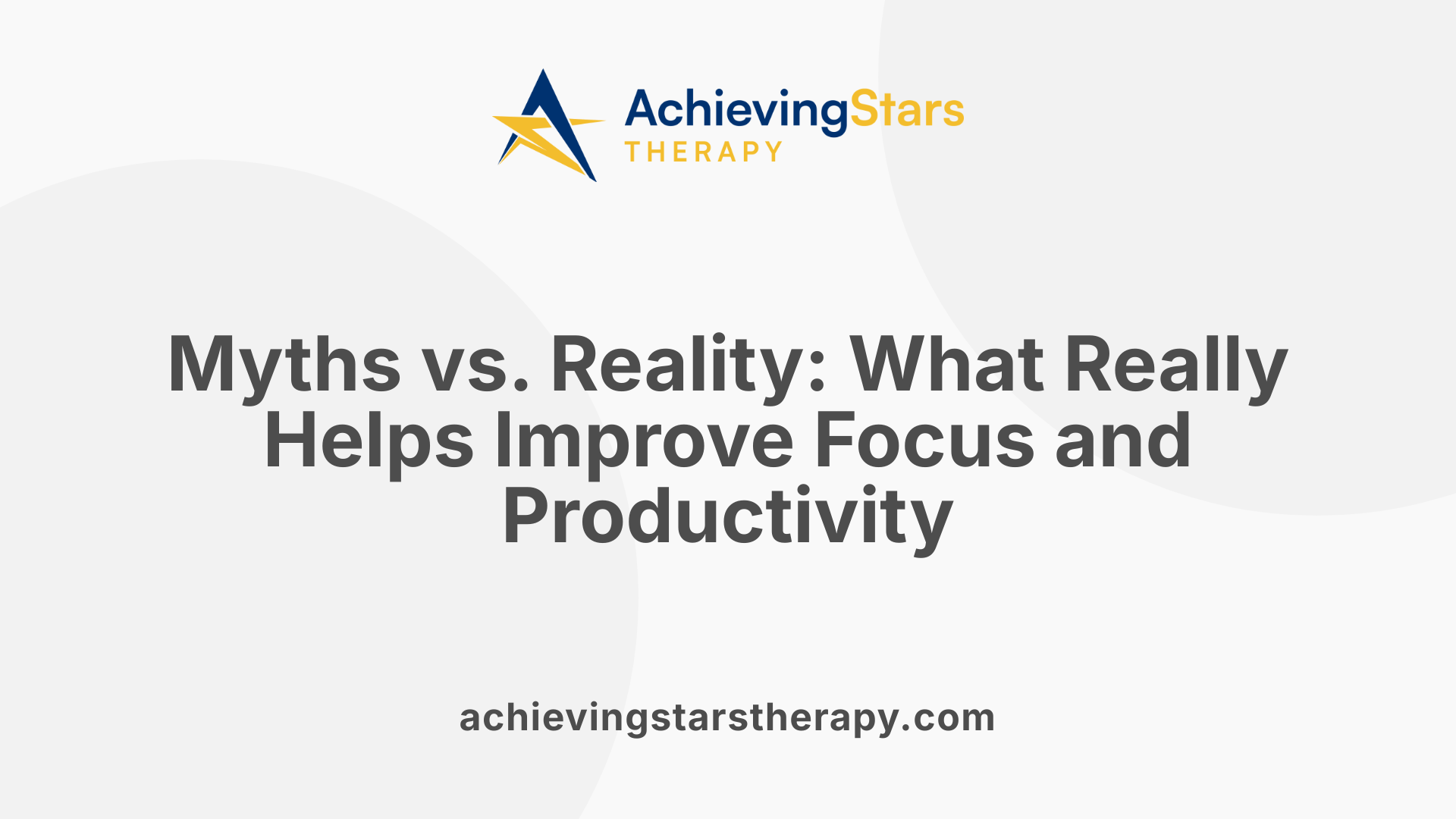
What are some common misconceptions about therapy’s role in improving focus and time management, and what are the effective practices?
A prevalent misconception is that therapy directly enhances an individual’s ability to focus or manage time more efficiently. In reality, therapy primarily helps individuals address underlying psychological, emotional, and behavioral barriers such as motivation issues, perfectionism, procrastination, or emotional avoidance that can impair focus and organization.
Many people believe that effective time management is solely about creating schedules or to-do lists. However, actual control over time is an illusion; what can be managed are actions, priorities, and habits. Proper time management involves developing routines, breaking larger tasks into smaller, achievable steps, and minimizing distractions like notifications or multitasking.
Implementing practical techniques is essential. For instance, the Pomodoro Technique involves working in focused intervals of typically 25 minutes, followed by short breaks—this fosters sustained attention. The Eisenhower Matrix helps prioritize tasks based on urgency and importance, ensuring that efforts align with significant goals.
Beyond these tools, understanding personal energy patterns and setting realistic boundaries around digital interruptions can drastically improve focus. For example, scheduling deep work sessions during times of peak energy ensures better concentration.
While therapy plays a supportive role by helping individuals understand internal obstacles and emotional patterns that interfere with productivity, tangible improvements rely heavily on applying actual time management strategies. Developing habits such as controlling distractions, setting clear goals, and consciously managing workload are crucial for meaningful progress.
In summary, effective focus and organization emerge from a combination of psychological insight provided by therapy and the consistent application of practical, evidence-based time management techniques. Together, these elements foster sustainable behavior change, leading to enhanced productivity and overall well-being.
Tools and Strategies from Therapy to Enhance Time Management and Focus
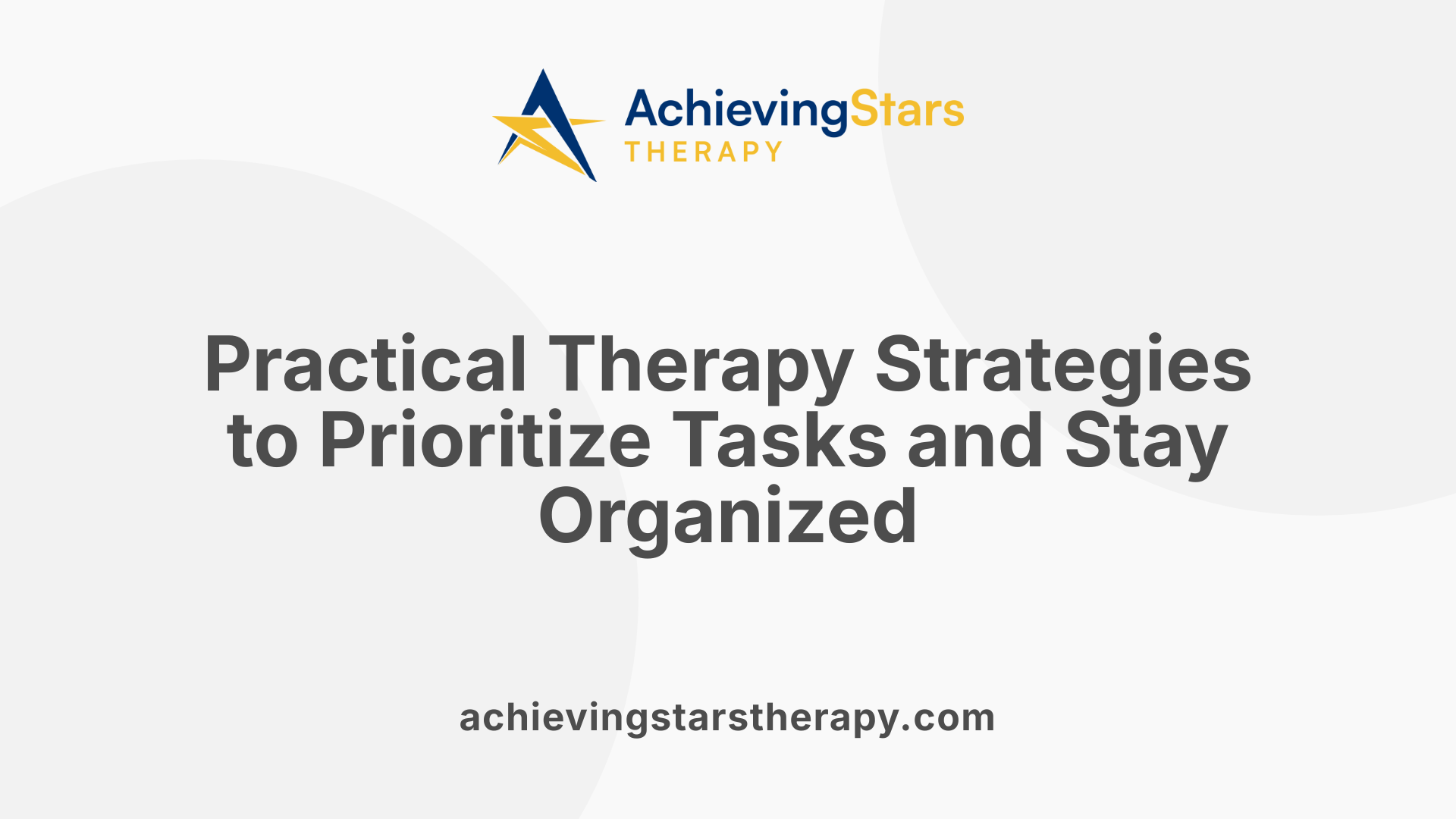
What strategies and tools from therapy can help individuals prioritize tasks, stay organized, and manage their time effectively?
Therapy provides a range of practical approaches and tools that support better time management and focus. One foundational technique involves goal setting, which helps clarify what is most important and align daily tasks with personal or professional aspirations.
Cognitive-behavioral therapy (CBT) is particularly effective in addressing obstacles like procrastination and perfectionism. Through this approach, clients learn to identify and challenge unhelpful thoughts that lead to avoidance or excessive self-criticism. This shift in mindset enables individuals to break tasks into smaller, manageable steps, reducing overwhelm and increasing productivity.
Frameworks like the Eisenhower Matrix assist in differentiating urgent and important activities, helping prioritize crucial tasks while delegating or postponing less critical ones. The 80/20 rule (Pareto principle) further guides individuals to focus on the few tasks that produce the most significant results, optimizing effort and energy.
Therapists often teach assertiveness skills to help clients confidently say no to unnecessary commitments, protecting their time and reducing stress. Establishing daily routines and consistent schedules fosters stability and positive habits, making time management more automatic.
Incorporating planning tools such as to-do lists, calendars, and visual schedules ensures tasks are clearly outlined and deadlines are visible. Mindfulness practices aid in managing distractions by enhancing attention and reducing impulsivity. Additionally, learning to set boundaries around work and personal life helps maintain a healthy balance.
Overall, these strategies—coupled with an awareness of individual habits and psychological patterns—empower individuals to control their time more effectively, leading to reduced stress and improved well-being.
Use of technological tools and apps
Modern technology offers numerous apps and tools designed to support effective time management. Calendar apps like Google Calendar enable scheduling and reminders, while task management platforms such as Todoist or Asana help organize and prioritize activities. The Pomodoro Technique, implemented via timers like Focus Booster or Tomato Timer, encourages work in focused intervals followed by short breaks, boosting concentration.
Visual timers and alert apps support clients in managing transitions and maintaining awareness of time spent on each activity. Many apps also integrate features for tracking habits, setting goals, and providing accountability. Utilizing such tools helps reinforce therapy strategies and ensures consistent application of organizational methods.
Role of accountability and regular review
Having accountability partners or engaging in regular review sessions with a therapist enhances the likelihood of sustaining improved time management behaviors. Routine check-ins facilitate reflection on progress, setbacks, and adjustments needed. These reviews motivate continued effort, reinforce positive changes, and address emerging challenges.
Therapists may encourage clients to keep time logs or journals, documenting how they allocate their time and noting patterns. This awareness helps identify distractions or unproductive habits, enabling targeted interventions.
In summary, combining therapeutic tools, technology, and accountability measures creates a comprehensive system that promotes efficient time management. Practical strategies like goal setting, prioritization frameworks, and routine reviews empower individuals to take control of their schedules, reduce stress, and achieve their personal and professional goals.
Empowering Your Time: The Lasting Impact of Therapy
Therapy serves as a transformative approach to improving how individuals manage their time and sustain focus. By addressing underlying psychological barriers, teaching proven strategies, and supporting behavioral change, therapy equips people with the skills needed for better organization, prioritization, and emotional regulation. The integration of therapeutic techniques with practical tools like time-blocking, prioritization frameworks, and mindfulness not only enhances productivity but also promotes mental well-being and resilience. Whether dealing with ADHD, perfectionism, or stress-related issues, engaging with therapy fosters a holistic growth that empowers individuals to control their time — rather than be controlled by it — leading to a more balanced and productive life.
References
- Time Management: 7 Techniques & 3 Tools to Help Clients
- Time Management - Counseling and Psychological Services
- How to Master Time Management in Therapy Sessions
- Can Therapy Help Make You More Productive?
- How ADHD Therapy Can Improve Focus and Productivity
- Time Management Counseling (Techniques, Tips and Tools)
- 9 Popular Time Management Techniques and Tools | USAHS
- Time Management - UA Counseling Center
- What Is Time Management: Effective Time Management Skills





